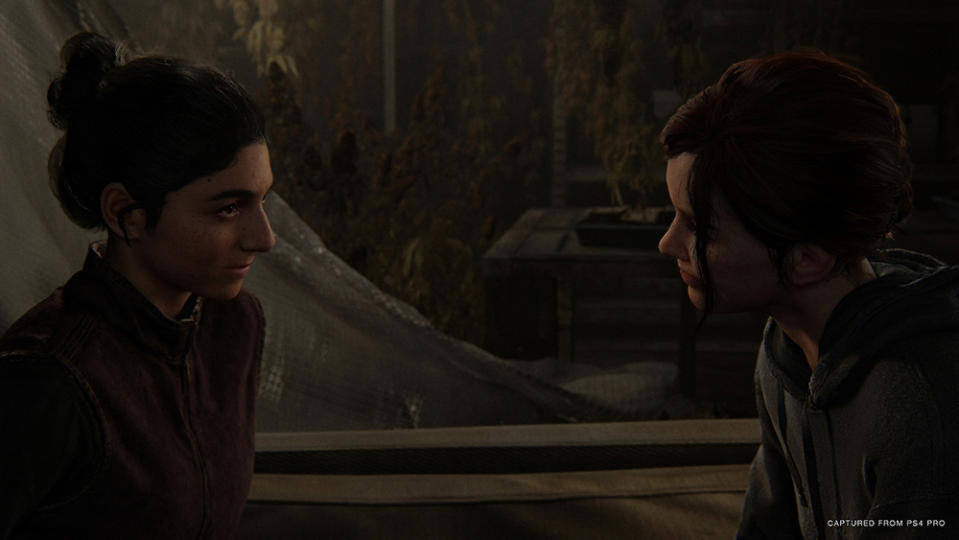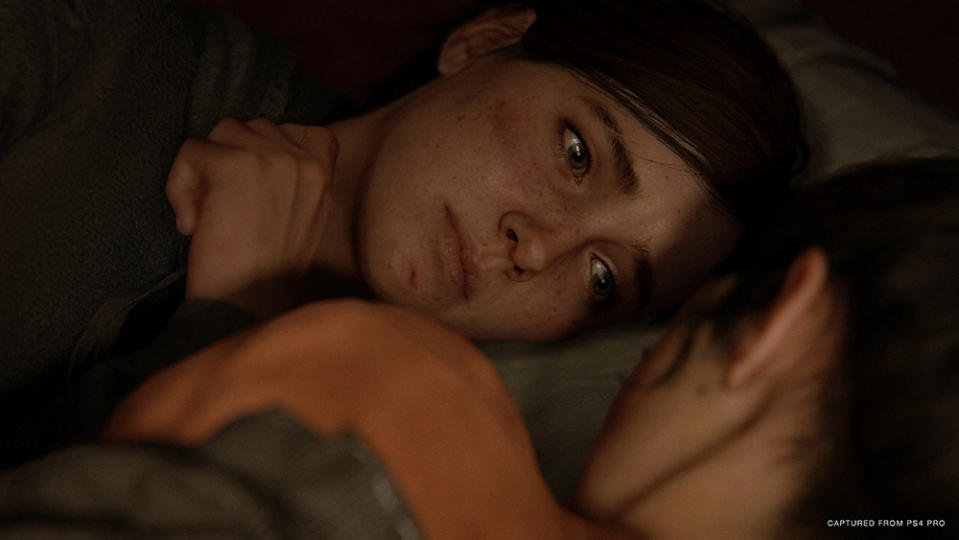How Shannon Woodward Went From ‘The Last of Us’ Fan to Playing New Character Dina in ‘Part II’

Click here to read the full article.
The highly anticipated “The Last of Us Part II,” released last Friday, obviously brings back the two characters at the center of the franchise: Joel and Ellie. But it also introduces a bevy of new characters to the infection-ravaged world, among them Dina, an outgoing, flirtatious, quick-witted young woman who becomes the love interest of Ellie.
Their relationship is at the heart of “Part II,” presenting some real warmth in a story that is so dark, it’s often hard to get through. According to Shannon Woodward, who voices Dina, that dynamic was of course born through the writing, but also her friendship with Ellie’s actor, Ashley Johnson. “Ashley and I are really tender with one another,” she says. “Even in the first time we read, there was already a dynamic where it was like, ‘you throw a ball and I’ll catch it.’ ”
More from Variety
Woodward, also known for her roles in “Westworld” and “Raising Hope,” talked to Variety about her love for “The Last of Us” (even before joining the cast), taking on a motion-capture role and what it was like joining the much-hyped sequel. (And for Variety‘s chat with Johnson, click here.)
Were you a fan of “The Last of Us” before getting this role?
Yeah, I think I played the game three times before having any involvement with it. I actually remember the first time I really heard about the game — I was aware of it, but my younger brother was living at my house at the time, and he was playing the game incredibly loudly, and I was trying to sleep. I had to work the next day. I was like, “You’ve gotta stop, it’s so loud.” And he was sobbing, he was like “I’m so sorry! Shannon, this game is so crazy. This girl — you spend all this time trying to protect her, and I just killed everyone!” I was like, “What are you talking about?” That was the first time I’d heard about the game, and he was like “You’ve gotta play it,” and I played it. It had a really profound effect on me. I think it was the first time I’d ever played a game that felt like it elevated the nature of storytelling that I’d ever experienced, in the sense that, when you watch a show or movie or read a novel, you’re an observer. This is the first time that I’d felt like I was making active choices as a player, so I felt complicit in those decisions. In the same way that a magician makes you pick a card, and you really feel like you chose that card, but that’s why they’re really good at their jobs. And that just really felt profound to me.

[Writer] Halley Gross and I had worked together on the first season of “Westworld” and we were on a hiatus, and I ran into her at a party and asked her afterwards what she was up to over the summer, and she was like, “I’m working at Naughty Dog.” I’m a big gamer, and obviously played “The Last of Us” and the “Uncharted” games, so I was like, “What are you working on at Naughty Dog?,” knowing that they just released “Uncharted 4.” I was like, “Is it ‘The Last of Us 2’?” And she just went really pale and was like, “I can’t talk about it!” And I was like, “Oh my god, I am such a big fan. You don’t have to say anything, but just tell [writer/director] Neil Druckmann that I’d die to have a line in the game.” And we went back and forth for a couple months and her being like, “Oh, he really likes ‘Westworld,’” and I was like, “I really like everything he’s ever done,” until a few months later, when she was like, “There is a role, but you have to audition.” And I was like, “Oh my god, you’re going to let me audition?” So then I auditioned, and then they hired me, and that’s how I like to say I stalked my way into being part of the game.
Ashley faces a certain kind of pressure in bringing back such a beloved character in Ellie, but I think you have a different kind of challenge in introducing a new character. Did you feel any kind of nervousness in that regard?
I should have. I think the easiest part for me about acting is when you know the world that you’re about to go into and as a fan of this game, I was just so excited to go live inside of it. One of the things that really moved me about the game is Ashley’s performance, which is the first time I’d ever seen a performance in a video game that felt so realistic, and it was nuanced, and calibrated in this way that I believe that person lived in this world in a real way. In a lot of post-apocalyptic stories, I feel like people really lose their sense of humor. People are really focused on, like, “It’s a hard life,” and yeah, but that’s been their entire life. People are still people, even when things are incredibly difficult. And so it really moved me, and I was very excited to jump in and live in that world, particularly with Ashley, because in my head, I played that game all the time, and I already loved Ellie. I already knew Ellie, just like every player. It was like they just let me loose and they were like, “okay, you can hang out with Ellie for four years off and on for a couple times a month.”
After you got the role, what kinds of conversations did you have with Ashley? Did you get any advice or insight from her?
We never really had conversations like that. Ashley and I were really always on the same page, and honestly, she is such a good actor that it was so easy for me to do my job. I just learned my lines, and then I was just reacting to Ashley. The thing is, you can say “hi, how are you?” and it can mean a million different things. You can be incredibly friendly or it can be incredibly condescending. So you can’t really plan for how another actor’s gonna perform, that’s how I see it. You know what a scene needs and what you think the scene is, and I just show up and respond to Ashley. And that’s the actor I kind of am, though. It’s chaotic and unpredictable, I have no idea what I’m gonna do – which I don’t know if that’s a good or bad thing, but that’s just kind of my style. I just kind of show up and believe it, which means it’s different every time. So I think even when I screen-tested with Ashley, I remember Neil only directed Ashley, and it was to see what I would do differently and it was so much fun, and that’s kind of how the whole shoot was. I mean, he would direct me too, but he would kind of say, “Shannon, do this,” and see how it affected Ashley. We really connected to each other very quickly and deeply.

That might play into Dina as a character a little bit – I don’t know if “fun” is the right word, but she gets some clever lines and offers some of the few moments of levity. How did her character develop over the past few years of making this game?
You know, I see a lot of Neil and Halley in a lot of these characters. Halley is really funny and irreverent and I think I am too. It’s hard for me to know how many of these things are chicken and the egg – like, there were a lot of things that were written before I was there, and I have no idea what they were. I’ve talked with Neil a lot about what I said earlier about general humor and what makes people feel whole is how they deal with trauma, and I think a lot of the ways people deal with trauma is through levity. And obviously within reason, but I think when it’s there, it’s not only a sense of release, but it makes people feel really human. So there were definitely places like that where I would think of a joke and I’d say, “come on, just let me say it!” And then they would. And there were some times in the booth, in the dialogue, they would’ve written jokes and they’d be like, “all right, Shannon you can have 15 seconds to go ahead and roll on your own jokes,” and some of them made it in.
This is your first motion-capture role. Was that a challenge to get used to?
At first, it was hard to get used to the camera right in front of my face, but I think it only took me about a half an hour where I could like, stop seeing it. And then it wasn’t a big deal. At first I was like, “Oh my god, this is so weird.” But in the same way when you shoot film and television, like you get pretty used to pretending 150 people aren’t standing right next to you when you’re doing a scene where you’re supposed to be very alone. So it was just a different kind of cognitive dissonance. I adjusted. It was harder to do the more intimate scenes where Ashley and I were sticking together with Velcro, and I know that like, that’s just the nature of the beast, but that was hard to get used to. We were constantly trying to adjust so that we wouldn’t, like, stick to each other in the middle of the scene and be like, “I can’t move! This is going great, but now my hand is stuck to your back!”
Has anything surprised you about response to the game? What do you think of the reactions that have come out?
I think this game is about love and grief, and I think people have a myriad of responses to it, and I think it is a testament to what I think is really special when people have a visceral reaction, and I think there’s a lot of visceral reaction, and I think that’s exciting. And I hope people enjoy it. I played the game for the first time a couple months ago and I’m still thinking about it, and I love the game. But it’s a lot to think about. It’s a lot to digest.
Best of Variety
Sign up for Variety’s Newsletter. For the latest news, follow us on Facebook, Twitter, and Instagram.

